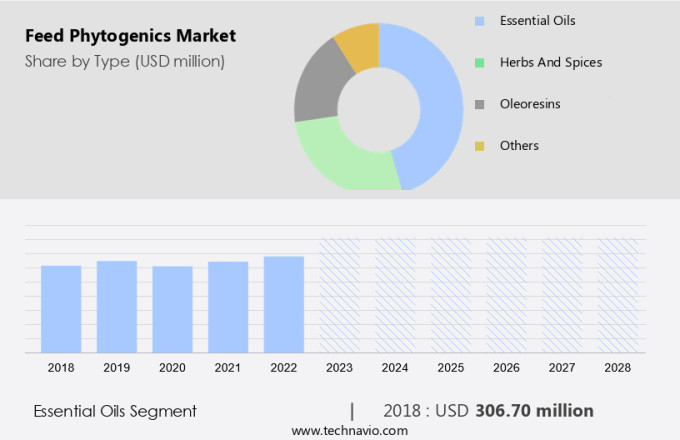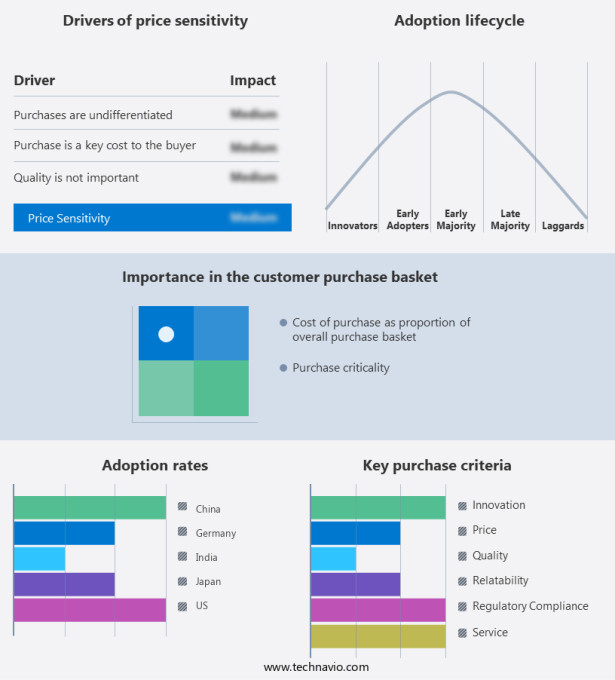Feed Phytogenics Market Size 2024-2028
The feed phytogenics market size is forecast to increase by USD 337.8 billion at a CAGR of 7.08% between 2023 and 2028. The market is experiencing significant growth, driven by the expanding poultry industry and the increasing adoption of encapsulated technology. The poultry sector's growth is attributed to the rising demand for eggs and pork meat, particularly in the foodservice and retail sectors. In the aquaculture industry, there is a growing trend toward using phytogenics in fish feed production to enhance fish growth and improve feed conversion rates. Additionally, consumer preferences are shifting toward plant-based diets, leading to an increase in demand for vegan food alternatives. The Department of Fisheries and Aquaculture in the US is also promoting the use of phytogenics in seafood production to reduce the reliance on traditional animal-derived feeds. Overall, these trends are expected to drive the growth of the market in the US, particularly in the egg, pig meat, and aquaculture sectors. The animal feed industry is experiencing a significant shift towards sustainable and natural solutions for livestock nutrition.
Phytogenics, derived from plant extracts, are gaining popularity as effective feed additives in the livestock industry. These natural solutions include organic acids, prebiotics, and probiotics, which enhance digestion, improve feed conversion efficiency, and boost animal performance. Phytogenics are particularly beneficial for poultry and swine production, as they help maintain gut health and reduce the use of antibiotics. With the EU government's push towards reducing antibiotic usage due to antibiotic resistance concerns, phytogenics offer a viable alternative. Ruminant livestock, such as cattle and sheep, also benefit from phytogenics, as they improve rumen fermentation and reduce methane emissions.
Furthermore, plant-derived feed additives, including phytogenics, are expected to dominate the feed additives market in the coming years. Feed phytogenic producers are investing in research and development to create innovative solutions for various animal populations. Silvateam SPA is one such company that specializes in phytogenic solutions for animal nutrition. Phytogenics not only improves animal health but also contributes to reducing zoonotic diseases and enhancing the overall sustainability of feed production in livestock farming.
Market Segmentation
The market research report provides comprehensive data (region-wise segment analysis), with forecasts and estimates in "USD million" for 2024-2028, as well as historical data from 2018-2022 for the following segments.
- Type
- Essential oils
- Herbs and spices
- Oleoresins
- Others
- Geography
- APAC
- China
- India
- Japan
- North America
- US
- Europe
- Germany
- South America
- Middle East and Africa
- APAC
By Type Insights
The essential oils segment is estimated to witness significant growth during the forecast period. The market is driven by the utilization of essential oils and oleoresins in livestock feed, particularly in the swine sector. Essential oils hold the largest market share and are anticipated to maintain their dominance due to their increasing significance as a substitute for antibiotics in animal nutrition. These natural additives enhance the shelf life of animal feed components and contribute positively to animal health and performance. Comprised of terpenoids and phenylpropanoids, essential oils exhibit antimicrobial properties, making them effective against various pathogens. Furthermore, they function as antioxidants, immuno-stimulants, and anti-inflammatory agents, thereby improving overall animal health.
Get a glance at the market share of various segments Request Free Sample
The essential oils segment was valued at USD 306.70 million in 2018 and showed a gradual increase during the forecast period.
Regional Insights
APAC is estimated to contribute 50% to the growth of the global market during the forecast period. Technavio's analysts have elaborately explained the regional trends and drivers that shape the market during the forecast period.
For more insights on the market share of various regions Request Free Sample
The market in the Asia Pacific (APAC) region is projected to expand significantly over the coming years. This growth can be attributed to the increasing consumption of swine meat, poultry, and other meat and meat products products in the region. Essential oils and oleoresins are commonly used phytogenic feed additives in livestock feed due to their antimicrobial properties. These additives help mitigate antibiotic resistance and improve animal health. In 2023, APAC emerged as the largest producer of feed phytogenics, with China, India, Japan, and Australia being the major markets. The formulation of poultry feed additives is based on various factors, including the bird's weight, age, growth rate, egg production, and environmental conditions.
Our researchers analyzed the data with 2023 as the base year, along with the key drivers, trends, and challenges. A holistic analysis of drivers will help companies refine their marketing strategies to gain a competitive advantage.
Market Driver
The growing poultry industry is the key driver of the market. The animal feed industry, a crucial component of the livestock nutrition sector, is experiencing notable growth, particularly in the poultry and swine segments. Organic acids, prebiotics, and probiotics are increasingly being adopted as essential feed additives to enhance animal health and productivity.
Furthermore, the global poultry market is projected to reach approximately USD 490 billion by 2026, driven by the growing demand for poultry products in both developed and developing economies. The poultry industry plays a significant role in the global food supply chain, with poultry being a primary source of protein for consumers worldwide. Despite the challenges faced in 2020, the poultry market in the US showed remarkable resilience and reported favorable growth in 2021.
Market Trends
The emergence of encapsulated technology is the upcoming trend in the market. Phytogenic feed additives derived from plants play a significant role in enhancing livestock nutrition in the animal feed industry. These additives include organic acids, prebiotics, and probiotics, which positively impact animal health by improving digestion, enhancing feed efficiency, and boosting immunity.
However, the delicate nature of these substances, particularly essential oils, poses processing challenges. High temperatures, dustiness, strong odors, oxidative, and volatile properties can lead to a loss of potency and efficiency. Encapsulation, a method of enclosing the active ingredient in a protective carrier material, is an effective solution. Spray drying, a flexible and economical encapsulation technique, is widely used in the food industry to preserve the integrity of bioactive molecules and living cells. This process ensures the delivery of phytogenics in their active form to animal feeds, thereby maximizing their benefits for poultry, swine, and pet feeds.
Market Challenge
The growing consumer inclination toward vegan food is a key challenge affecting the market growth. The animal feed industry is witnessing significant changes with the increasing focus on improving livestock nutrition through the use of organic acids, prebiotics, and probiotics. These additives enhance the digestive system of animals, leading to better feed conversion rates and improved animal health. The use of these nutritional supplements is prevalent in various livestock sectors, including poultry and swine.
In addition, there is a growing demand for organic and natural feed ingredients in pet food production. This trend is driven by the increasing awareness of the benefits of these additives and the rising demand for high-quality animal products. Despite this growth, the increasing popularity of veganism and the subsequent reduction in meat consumption may impact the demand for animal feed vitamins.
Exclusive Customer Landscape
The market forecasting report includes the adoption lifecycle of the market, covering from the innovator's stage to the laggard's stage. It focuses on adoption rates in different regions based on penetration. Furthermore, the report also includes key purchase criteria and drivers of price sensitivity to help companies evaluate and develop their market growth analysis strategies.
Customer Landscape
Key Companies & Market Insights
Companies are implementing various strategies, such as strategic alliances, partnerships, mergers and acquisitions, geographical expansion, and product/service launches, to enhance their presence in the market.
Archer Daniels Midland Co.: The company offers feed phytogenics additives under its brand Pancosma.
The market research and growth report includes detailed analyses of the competitive landscape of the market and information about key companies, including:
- Adisseo Co.
- AVT Natural Products Ltd.
- BASF SE
- BIOMIN Holding GmbH
- Cargill Inc.
- Complete Solution for Poultry Inc.
- DOSTOFARM GmbH
- Himalaya Global Holdings Ltd.
- International Flavors and Fragrances Inc.
- Kemin Industries Inc.
- Kerry Group Plc
- Koninklijke DSM NV
- Miavit GmbH
- Natural Remedies Pvt. Ltd.
- Novus International Inc.
- Nutrex NV
- Nutricare Life Science Pvt. Ltd.
- Phytobiotics Futterzusatzstoffe GmbH
- Phytosynthese
Qualitative and quantitative analysis of companies has been conducted to help clients understand the wider business environment as well as the strengths and weaknesses of key market players. Data is qualitatively analyzed to categorize companies as pure play, category-focused, industry-focused, and diversified; it is quantitatively analyzed to categorize companies as dominant, leading, strong, tentative, and weak.
Research Analyst Overview
The animal feed industry is witnessing significant growth due to the increasing demand for livestock nutrition that enhances livestock performance and productivity. The growth of the poultry and dairy farmers, alongside increased seafood consumption and Ruminant performance, has prompted budget allocation for emergency funding, particularly for farmers like Almarai, while the rising animal population and demand for chicken meat highlight the importance of innovative solutions like dry phytogenic feed additives in optimizing meat and meat product production. Phytogenics, a category of plant-derived feed additives, are gaining popularity in the industry as an effective alternative to antibiotics. These additives include organic acids, prebiotics, probiotics, essential oils, and oleoresins, which possess antimicrobial properties and improve the health of livestock. Phytogenics are used extensively in the production of feed for poultry, swine, and pet foods. They have been shown to improve the performance of ruminants and enhance the quality of pork intake and poultry population growth. The use of phytogenics also addresses the issue of antibiotic resistance and the risk of zoonotic diseases.
Furthermore, the feed phytogenic producers are investing in research and development to expand their product offerings and cater to the growing demand for these additives. Phytogenics are also being explored as feed antibiotic substitutes in the aquaculture industry, particularly in the production of fish feed for aquatic species such as shrimp. The livestock industry, including small-scale farmers, is increasingly allocating budgets towards the adoption of phytogenics to improve livestock production and meet the rising demand for meat and organic dairy products. The European market for phytogenics is expected to grow significantly due to the increasing awareness of the health benefits of these additives and the stringent regulations regarding the use of antibiotics in animal feed. Phytogenics are also gaining popularity in the pet food industry as they offer natural alternatives to synthetic additives and provide additional health benefits to pets. The use of phytogenics in the production of feed for ruminants, poultry, swine, and aquatic species is expected to drive the growth of the market in the coming years.
|
Market Scope |
|
|
Report Coverage |
Details |
|
Page number |
142 |
|
Base year |
2023 |
|
Historic period |
2018-2022 |
|
Forecast period |
2024-2028 |
|
Growth momentum & CAGR |
Accelerate at a CAGR of 7.08% |
|
Market growth 2024-2028 |
USD 337.8 million |
|
Market structure |
Fragmented |
|
YoY growth 2023-2024(%) |
6.49 |
|
Regional analysis |
APAC, North America, Europe, South America, and Middle East and Africa |
|
Performing market contribution |
APAC at 50% |
|
Key countries |
US, China, Japan, India, and Germany |
|
Competitive landscape |
Leading Companies, Market Positioning of Companies, Competitive Strategies, and Industry Risks |
|
Key companies profiled |
Adisseo Co., Archer Daniels Midland Co., AVT Natural Products Ltd., BASF SE, BIOMIN Holding GmbH, Cargill Inc., Complete Solution for Poultry Inc., DOSTOFARM GmbH, Himalaya Global Holdings Ltd., International Flavors and Fragrances Inc., Kemin Industries Inc., Kerry Group Plc, Koninklijke DSM NV, Miavit GmbH, Natural Remedies Pvt. Ltd., Novus International Inc., Nutrex NV, Nutricare Life Science Pvt. Ltd., Phytobiotics Futterzusatzstoffe GmbH, and Phytosynthese |
|
Market dynamics |
Parent market analysis, market growth inducers and obstacles, market forecast, fast-growing and slow-growing segment analysis, COVID-19 impact and recovery analysis and future consumer dynamics, market condition analysis for the forecast period |
|
Customization purview |
If our market report has not included the data that you are looking for, you can reach out to our analysts and get segments customized. |
What are the Key Data Covered in this Market Research and Growth Report?
- CAGR of the market during the forecast period
- Detailed information on factors that will drive the market growth and forecasting between 2024 and 2028
- Precise estimation of the size of the market and its contribution of the market in focus to the parent market
- Accurate predictions about upcoming market growth and trends and changes in consumer behaviour
- Growth of the market across APAC, North America, Europe, South America, and Middle East and Africa
- Thorough analysis of the market's competitive landscape and detailed information about companies
- Comprehensive analysis of factors that will challenge the growth of market companies
We can help! Our analysts can customize this market research report to meet your requirements. Get in touch




